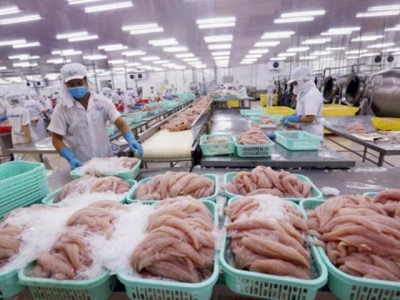Indian seafood exporters distressed over tightening Chinese market

Seafood exporters in India are becoming increasingly worried about difficulties shipping to China in advance of the Lunar New Year holiday.
In the latter half of 2020, Chinese authorities reportedly detected coronavirus on the packaging of imported seafood and, in response, imposed bans on a number of exporters and implemented strict inspection measures on seafood imports. As a result, a huge number of containers of imported frozen seafood have piled up in the Chinese ports of Dalian and Tianjin as local authorities conduct COVID testing, which is now required for all seafood products passing through customs.
Local governments in China have also taken aggressive measures against imported seafood over COVID concerns. In December, authorities in the northwesterly city of Xi’an, a large city in China, banned vendors from selling or stocking imported seafood. And an exporter in Gujarat’s Veraval City told SeafoodSource his firm has many containers stuck in Tianjin because his Chinese buyers are not allowed to sell any imported seafood in the local market. The ban may relate to Chinese authorities’ efforts to ensure safety during the coming Lunar New Year holiday, which lasts from 11 to 17 February. With his Chinese partners are unable to pay, the exporter is eating all costs of the shipment thus far.
“They just don’t want to spoil their festival this time,” the exporter, who asked for anonymity, said. “I hope everything will be normal after the Chinese New Year.”
Given the difficulties he’s encountered, the Gujarati exporter is considering moving his business out of China.
“Ribbonfish was my main product and I still have some containers in my cold storage,” he said. “Next season, my aim is to export to Vietnam and Thailand more, like cuttlefish, squid, Indian mackerel, octopus.”
Naeem Banglawala, an organic shrimp farm operator with 100 hectares of farms in Gujarat and director of a company that supplies raw material to processors and exporters, told SeafoodSource on 25 January he is not aware of any ban on exports to China. But exporters he knows have told Banglawala they are encountering problems in finding freight capacity, including trouble confirming vessels, delays in clearance, and as a result, postponed payments. They hope the situation will improve by the end of this quarter, Banglawala said.
However, the slowdown in China’s purchasing of seafood products from India is a longer-term trend, ongoing since a border dispute in 2020. There has been a noted slowdown in customs clearance in Chinese ports for shrimp shipments from India since June 2020, with average customs clearance timetable rising from three to 10 days over last summer.
Those delays have created difficulties for Indian farmers and exporters, especially in Gujarat and Kerala, which were already suffering economically due to the pandemic. Exporters in Kerala are expecting their revenue to fall between 30 to 40 percent in this fiscal year, which ends 31 March, off IRN 50 billion (USD 683.5 million, EUR 564.3 million) in the 2019-2020 fiscal year. A drop in shipments to China and a resulting delay in payments are the primary reasons, according to The Hindu BusinessLine.
Another industry source in Andhra Pradesh told SeafoodSource demand for seafood from Chinese buyers had dropped further in the past few weeks. But he said orders from China are likely to resume after China’s Lunar New Year, when prices in India are likely to decline.
“Current prices from India are high, so buyers are probably also waiting for the prices to adjust lower for the new season arrivals in March/April,” he said. “There are issues related to inspections and delayed clearance, causing some hesitancy on the part of India packers to offer China.” He added that the main market for most Indian packers remains the U.S. and that China is a back-up market utilized when shrimp prices drop.
Seafood Exporters Association of India (SEAI) Kerala Chapter President Alex K. Ninan said many local seafood exporters are facing a tough time due to the difficulties in exporting to China. His association has approached the India government for help, but hasn’t yet received a response, The New Indian Express reported.
The difficulties facing seafood exporters have affected India’s entire supply chain, with fishermen forced to significantly cut their days at sea. The All Kerala Fishing Boat Operators Association has also sought for support from the central government. The association’s general secretary, Joseph Xavier Kalappurackal, said the fishing community has been hit hard by local pandemic-related lockdowns, and that many fishermen and boat workers have fallen into extreme poverty.
The Gujarat exporter contacted by SeafoodSource said local fishermen are in a very difficult situation right now and are earning much less than before the problems with China arose.
“The fishing season is on and already [fishermen] stopped going for fishing because of heavy losses,” he said. “And even if they get fish, [many] factories are not able to give them payments as early as before.”
Có thể bạn quan tâm
 Bạc Liêu should focus on hi-tech shrimp farming: deputy minister
Bạc Liêu should focus on hi-tech shrimp farming: deputy minister The southern province of Bạc Liêu should focus on super intensive, high-tech shrimp farming to become the nation’s shrimp hub, Deputy Minister of Agriculture
 Vietnam’s shrimp export value falls in February following surge in January
Vietnam’s shrimp export value falls in February following surge in January Vietnam's shrimp exports declined in value in February, following an increase in the first month of the year
 BioMar buys into Viet-Uc’s shrimp-feed business
BioMar buys into Viet-Uc’s shrimp-feed business The partnership will focus on producing high-end feed products to meet sustainability, traceability, and quality requirements of the shrimp industry.